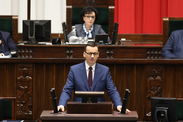-

Aleksander Łaszek: Is Warsaw facing de facto Polexit?, Deutsche Welle | 2020-12-08
more"Fortunately, at the moment no one is seriously thinking about Polexit in Poland and our membership has strong public support," Aleksander Laszek, chief economist at the Civil Development Forum, a think tank in Warsaw, told DW.

Analysis 3/2020: Responses to COVID-19 of governments in selected countries | 2020-04-17
COVID-19 pandemic is a serious challenge for societies around the world. In response to it not only individuals are changing their behavior, but also governments are taking various policy actions. In order to compare responses in different countries we have gathered information from Bulgaria, Czech Republic, Lithuanian, Georgia, Germany, Greece, Hungary, Poland, Slovakia, Slovenia and the UK. Overview of the policy responses in those countries highlights both common patterns and some profound differences.

FOR Communication 12/2020: How to Use the Data to Fight the Coronavirus? | 2020-04-02
The coronavirus is a deadly danger for many people, but a large proportion of those infected do not experience any symptoms. Available mortality data show that the disease represents the greatest risk for the elderly and those suffering from other diseases.
-

FOR Communication 11/2020: State Support for Companies - Complicated, Discretionary and Delayed | 2020-03-30
moreAt present, the most important challenge is to maintain jobs and support people who cannot work in Poland due to the coronavirus and actions aimed at reducing the scale of the epidemic. On the one hand, this requires the support of companies that pay their employees but, deprived of income, are themselves at risk of bankruptcy. On the other hand, it requires support for people who have worked in unusual forms of employment and have lost their jobs overnight.
-

FOR Communication 9/2020: Aid to Employees Now, and Settlement after the Pandemic | 2020-03-26
moreThe coronavirus pandemic is already having a huge negative impact on the economy. Its mitigation should serve two purposes: to support people who are losing income because they can't work as a result of the pandemic and to prevent the bankruptcy of companies that cannot operate due to the pandemic so that their employees can return to work after it is over.
-

FOR Communication 8/2020: Coronavirus and What Next? FOR’S Economic Prescription | 2020-03-18
moreGovernment action should be primarily aimed at making it easier for companies to survive the epidemic and maintain employment. The scale of the intervention should depend on the duration of the epidemic - the emphasis should first be on deferring taxes and contributions, then on guarantees and loans, and only at the end on writing off part of the liabilities.
-

FOR Communication 6/2020: Public Finances Not Prepared for Coronavirus | 2020-03-12
moreThe Law and Justice government wasted the 5 years of prosperity, as a result of which the Polish public finances and the health care system are not prepared for the coronavirus epidemic. A "Balanced budget" is an accounting trick, serving the government's propaganda - in fact, the planned deficit of the public finance sector, after deducting one-off revenues, was to reach 2.2% of GDP in 2020 (over PLN 50 billion), which is just under 2.6% of GDP recorded in 2015. At the same time 13 EU countries were planning to achieve surpluses. Additionally, no major reform to increase the efficiency of the health service has been carried out, focusing primarily on increasing social transfers.
-

Aleksander Łaszek: Could Poland catch up with Germany's economy?, Deutsche Welle | 2020-02-19
moreThe Law and Justice party leader, Jaroslaw Kaczynski, has claimed that Poland's economy will catch up with Germany's by 2040. It is a bold claim by any standard, but could it become a possibility?
-

FOR Communication 31/2019: How Seriously Does the Government Treat Taxpayers and the Expenditure Rule? | 2019-10-30
moreAfter the election campaign, the Law and Justice Party stopped pretending that the 2020 budget would be deficit-free, starting a discussion on its amendment. The implementation of the new election promises will be difficult to reconcile with the existing spending rule, but there have already been voices offering it to be softened, such as Prof. Łukasz Hardt of the Monetary Policy Council.
-

Leszek Balcerowicz, Aleksander Łaszek: Poland’s economic miracle won’t last, POLITICO | 2019-10-10
moreSince coming to power in 2015, Poland’s ruling Law and Justice (PiS) party has captured state institutions, attacked the independence of the courts and violated the basic norms of the legislative process.
Despite these controversial moves, the government has maintained a high level of support among Polish voters. In large part, that’s because the Polish economy is still surprisingly strong.
